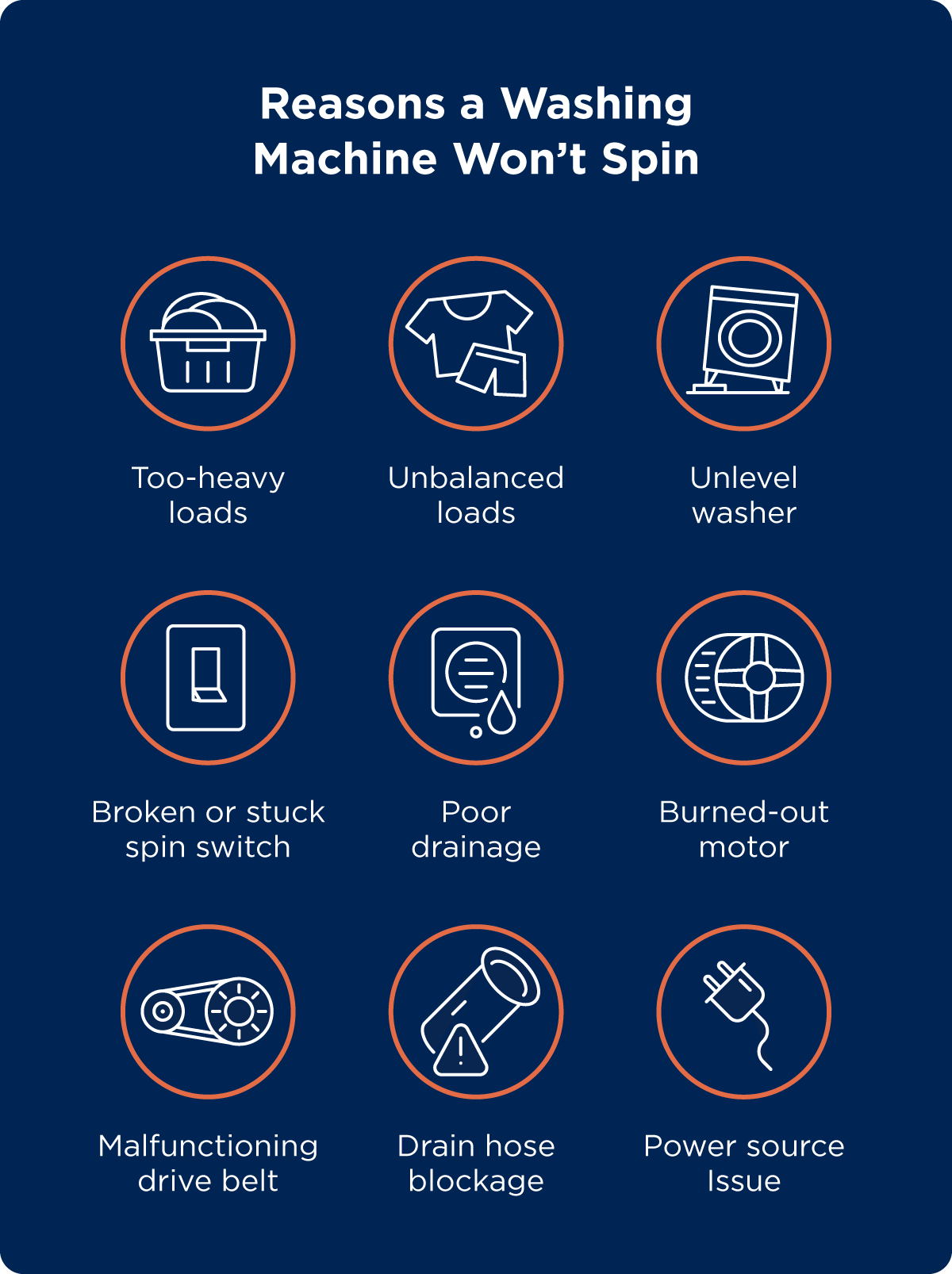Washer Not Spinning? 9 Common Causes (And How To Fix Them)

A washer not spinning properly can turn a quick load of laundry into a sopping mess.
If your clothes are coming out wet or not clean or your washing machine starts and stops, the problem could be caused by several issues. Learn how to determine what’s causing the problem, some quick fixes, and when to call a professional.
Reasons your washer won’t spin may include:
- Too-heavy loads
- Unbalanced loads
- Unlevel washer
- Broken or stuck spin switch
- Poor drainage
- Burned-out motor
- Malfunctioning drive belt
- Drain hose blockage
- Power source issue

1. Too-Heavy Loads
Filling up the washing machine too much may cause the machine to not spin at full speed. Heavy loads can also cause your washer to "walk" or move forward during the spin cycle. Newer machines with sensors won't start at all if the load is too heavy.
When a washing machine is overloaded, it throws off the weight distribution, causing the machine to detect an imbalance. To prevent damage to the appliance, the machine's sensors automatically stop the spin cycle. This overload sensor is essential to prevent an unbalanced load, which can lead to excessive vibration, noise, and potential mechanical damage to the machine's components.
How To Fix It
The easiest method to avoid an overfilled washer not spinning clothes dry is to try washing smaller loads. Most washing machines include a fill-to line on the inside of the drum that you should adhere to. In addition, don't pack laundry tightly into the machine, distributing it evenly instead.
If the problem persists, contact an appliance service professional to address the issue.
2. Unbalanced Loads
An unbalanced load can cause a washing machine to stop spinning mid-cycle. This occurs because the machine's sensors detect an uneven distribution of weight within the drum. This often occurs when heavier items, like jeans or bedding, clump together and stay on one side of the machine or if items wrap around the agitator during the wash. It can also occur if the machine is overloaded or underloaded, causing an imbalance and even a risk of leaks.
Mechanical problems with the machine, such as worn-out shock absorbers or suspension springs, can also contribute to imbalance, even with a balanced load.
How To Fix It
To resolve the issue, pause the cycle, open the lid, and redistribute the laundry more evenly around the drum. Once the load is balanced, restart the spin cycle. It's important to avoid overloading the machine, as this can contribute to an unbalanced load and hinder the spin cycle's effectiveness.
If the issue is mechanical, a service professional can examine the machine to determine the cause and repair or replace any necessary parts.
3. Unlevel Washer
Washing machines come on four small pedestal legs, which can become uneven during repeat wash and spin cycles. This causes the signature rocking or “walking” and loud noises often associated with the spin cycle.
This imbalance can cause the machine's sensors to detect instability, triggering the safety mechanism that stops the spin cycle prematurely. An uneven machine can also put extra strain on its internal components, potentially leading to premature wear and tear.
How To Fix It
To ensure optimal performance and longevity, it's crucial to level your washing machine. Use a level tool to check if the machine sits evenly on all four feet. If not, adjust the feet accordingly to correct the imbalance. By taking this simple step, you can prevent unnecessary issues and maintain the efficiency of your washing machine.
If this problem has been occurring for some time or is not resolved by adjusting the feet, it’s time to call a professional. They will inspect the machine thoroughly to ensure that the internal components are operating optimally and offer solutions to improve its longevity.
4. Broken or Stuck Spin Switch
A machine that drains but doesn’t spin, leaving items sopping wet, is most likely caused by a displaced or faulty lid switch. This small switch should be pressed down by the lid when it’s closed. If it isn’t pressed down, your machine may prevent the spin cycle as a safety measure.
How To Fix It
It's best to have a service professional look at it to ensure it is fixed properly.

5. Poor Drainage
Poor drainage can significantly affect a washing machine's ability to spin. If water can't drain properly, the machine's sensors may detect excess water levels, preventing the spin cycle from even starting. This safety measure is designed to protect the machine from potential damage caused by excessive water.
Poor drainage can also lead to longer wash cycles as the machine attempts to remove excess water. This can result in increased energy consumption, potential wear and tear on the machine's components, and even an increase in mildew and mold in the washer.
How To Fix It
To address poor drainage, it's important to check the drain hose for clogs or kinks, clean the pump filter, and ensure the drain pipe is not blocked. If the issue persists, consulting a service professional may be necessary.
6. Burned-Out Motor
If the washing machine spins for a few seconds and then stops, the drive motor may have burned out. Additional signs that the issue may be the motor include:
- No sound during the spin cycle: If you don't hear the usual humming or whirring noise associated with the spin cycle, it could be a motor problem or various other issues.
- Burning smell: A burning odor coming from the machine often indicates a motor that's overheating and may be failing.
How To Fix It
Washing machine motor repairs should be handled by trained professionals. They can quickly diagnose the issue and determine the necessary repairs. In many cases, replacing the motor is the most effective solution. However, it's important to consult with a professional to ensure accurate diagnosis and repair.
7. Malfunctioning Drive Belt
A machine that’s draining but not spinning at all, , may have a broken or displaced drive belt. The machine may also make a lot of noise, such as squealing, grinding, or clicking. If the spin cycle is significantly slower than usual, it could also indicate a slipping or damaged belt.
How To Fix It
You may need a professional’s help to fix the drive belt. An expert would remove the back panel of your washer and see if it’s still in place on the pulleys. A slipped belt is a worn-out one and needs to be replaced by a professional.
8. Drain Hose Blockage
Many washers won’t move to the next cycle until they drain — standing water in your appliance may or may not cause it to just keep running. Check your washer’s drain hose to ensure it’s not clogged, kinked, or blocked. A damaged hose will need to be replaced, but you can unclog a hose manually, which may help the appliance drain.
How To Fix It
Because we are talking about many gallons of water and a potential flood, it is best to let a service professional determine if the washer is clogged and how best to fix it.
9. Power Source Issue
If, after all of that, your washing machine isn’t running at all, check the power! Whether the power cord was accidentally disconnected or there’s a power issue in your home or area, a washing machine needs power to run.
How To Fix It
Make sure your washing machine is plugged in and that the plug isn’t loose. Always plug your heavy-duty appliances like washing machines directly into the wall instead of using an extension cord. Check the breaker box to see if you have a tripped breaker or blown a fuse. If necessary, contact an electrician to install a dedicated circuit.
Signs of a Washing Machine Not Spinning Properly
If your washing machine is in your basement, garage, or a secluded laundry room, you won’t have an eye or ear on it every time it runs. Even if you do see and hear it, you might still be wondering how to tell if your washing machine won’t spin. Signs include:
- Clothes are coming out soaked
- You're not able to see, hear, or feel the spin cycle
- Heavier loads aren’t getting clean
- A mildewy smell in the washer
Call Mr. Appliance for Washer Repair
Since the washing machine is an appliance we rely on regularly to keep the household running smoothly, it can create a real problem when it stops spinning.
If the suggested fixes don’t solve your washing machine problem, it’s time to call the pros. Your local Mr. Appliance can complete your washing machine repairs and help ensure your other major appliances continue to run smoothly.
Get started by scheduling service today!
This article is intended for general informational purposes only and may not be applicable to every situation. You are responsible for determining the proper course of action for your home and property. Mr. Appliance is not responsible for any damages that occur as a result of this blog content or your actions. For the most accurate guidance, contact the Mr. Appliance location nearest you for a comprehensive, on-site assessment.
FAQ About Washers Not Spinning
Integrity, dependability, and exceptional customer service are the qualities that have made Mr. Appliance the go-to resource for appliance maintenance and repairs. All independently owned and operated Mr. Appliance locations are committed to providing the top-notch service you expect from an industry leader. This commitment also includes using our expertise and years of experience to answer your appliance-related questions.
Here are answers to some of the most frequently asked questions about washers not spinning.
How Do You Fix a Washer That Won’t Spin?
To fix a washing machine that won't spin, first check for simple issues like an unbalanced load or a clogged drain hose. If the problem persists, it could be a more complex issue like a broken drive belt or a faulty motor, which requires the help of an appliance repair professional.
How Do I Reset My Washing Machine to Spin?
To reset a washing machine, unplug it for a few minutes, then plug it back in. Open and close the lid six times within 12 seconds. This can reset the electronics and hopefully resolve the issue. If the problem persists, consult a service professional.
Why Is My Washing Machine Not Spinning and Making a Noise?
A washing machine may not spin and make noise for various reasons. Common causes include an unbalanced load, a broken drive belt, a faulty motor, or a clogged drain pump. It's essential to diagnose the specific issue to determine the appropriate solution, which may involve simple adjustments or professional repair.
Why Is the Basket Not Spinning on the Washing Machine?
The basket of the washing machine not spinning can be due to several issues, such as a broken belt drive or a clogged drain pump. If the issue persists, consult a service professional for help.
 Click to call
Click to call


